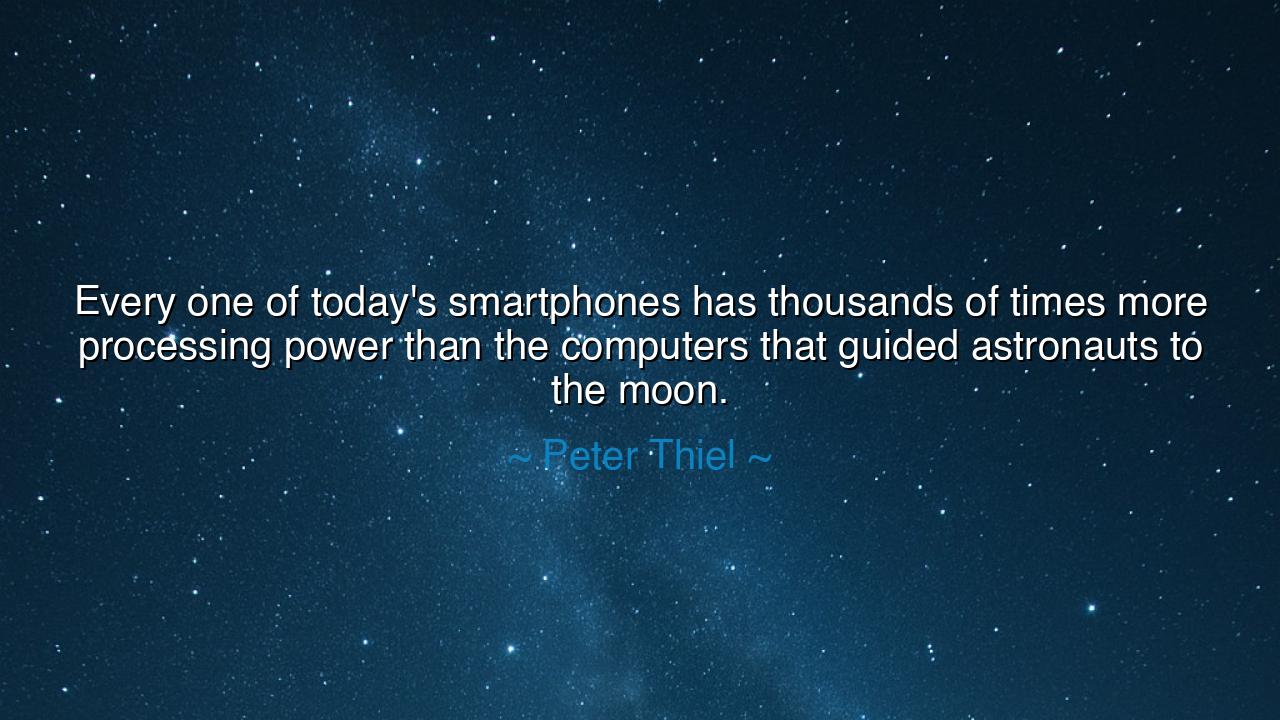
Every one of today's smartphones has thousands of times more
Every one of today's smartphones has thousands of times more processing power than the computers that guided astronauts to the moon.






In the quiet chambers of time, where men once looked to the stars and dreamed of the impossible, there was a time when technology was seen as the ultimate force that could break the boundaries of human ambition. The year was 1969, and the world held its breath as the first astronauts set foot on the surface of the moon. Their journey, guided by computers that seemed ancient by today's standards, marked the pinnacle of human achievement. Yet, today, we stand in awe not of what these great machines could do, but of what has come to pass since: smartphones in our pockets, holding thousands of times more processing power than those that once guided men through the void of space. This insight, offered by Peter Thiel, invites us to reflect on the rapid ascent of human innovation and the profound change it has wrought.
Thiel’s words carry the weight of a quiet revelation: that which once seemed the pinnacle of human ingenuity, the technology that reached to the heavens, now lies dwarfed by the small devices we carry with us every day. A smartphone, no longer merely a device for conversation, has become a supercomputer, an instrument capable of feats that were once relegated to the realm of science fiction. The immense processing power contained within these compact devices reminds us of how far we have come. From the Apollo missions to today’s microchips, the march of technological progress is nothing short of miraculous, and yet, we scarcely pause to acknowledge the true nature of this transformation.
To understand the true significance of Thiel's words, we must look back to the ancient times when men and women faced their greatest challenges with tools far more rudimentary than anything we know today. The great philosophers and thinkers, from Socrates to Aristotle, spoke of the limitations of human knowledge and the humble nature of our understanding. Yet even in their time, innovation was born of human determination—whether through the wheel, the sail, or the plow. These were the tools of the ancients, and they, too, were revolutionary in their own right. Yet, what Thiel calls our attention to is the relentless acceleration of progress, the sheer force of human ingenuity that transforms the world in a fraction of the time once required.
Consider the story of Leonardo da Vinci, whose visions of flying machines, tanks, and submarines were far beyond the capabilities of his time. He was a visionary, not bound by the limitations of his era but seeing beyond to what humanity could one day achieve. And yet, even Leonardo—with all his brilliance—could only dream of what we take for granted today. His creations were imagined on paper, while today we possess the ability to fly, to explore the depths of the ocean, and even reach for the stars. And in our pockets, we carry with us the equivalent of the tools that made such dreams possible. The smartphone is but one modern example of this tremendous leap, one that encapsulates the boundless potential of human creativity and innovation.
It is important to understand that with such power comes a profound responsibility. Just as the ancient Greeks cautioned against hubris—the dangerous pride of men who sought to outdo the gods—so too must we temper our use of technology with wisdom. The capacity to create is matched only by the capacity to destroy. If we do not wield our newfound powers with thoughtfulness and care, we risk losing sight of the very purpose that drives us forward: to improve the human condition, not to overwhelm it with our own creations. Our smartphones, and the technologies that power them, should serve to elevate our minds, not enslave them in the pursuit of distractions.
In this age of instant communication, where the world is at our fingertips, let us not forget the lesson of those who reached for the stars without the tools we now take for granted. The astronauts who voyaged to the moon did so not because they had superior technology, but because they possessed the courage, the vision, and the resolve to confront the unknown. Their journey serves as a reminder that human willpower—not technology—was the true force that carried them beyond the limits of what was once considered possible. It is the same willpower that must guide us as we step forward into the future.
The lesson here is not merely one of technological marvel, but of human potential. Thiel’s reflection calls us to action. We must not become complacent, believing that the very tools we carry will solve all our problems. Instead, we must ask ourselves how we can use these incredible devices—these small supercomputers in our pockets—to create, to innovate, and to move humanity toward a better future. Let us, like those who came before us, dare to imagine what we might achieve with the power we now hold in our hands. And let us remember that the true power lies not in the device itself, but in the mind that wields it.






AAdministratorAdministrator
Welcome, honored guests. Please leave a comment, we will respond soon